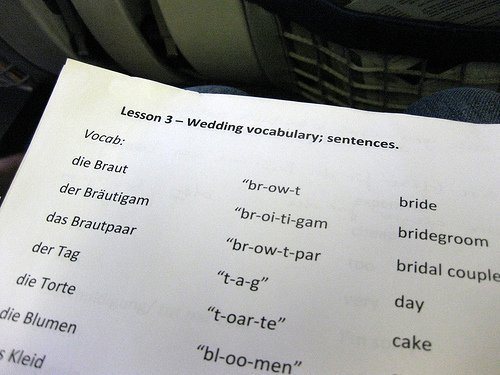Learning Vocabulary (Part Two)
 |
Click to get this lesson as an Adobe Acrobat file for printing or use in a class. |
 |
Click to listen to this lesson while you read. |
Click Here for Step-by-Step Rules, Stories and Exercises to Practice All English Tenses
After you've triaged your vocabulary and you know exactly what words you want to learn, how do you make them stick?

The most honest answer I can give you is: "I don't know." When I started the how to learn English series I said that I can't tell you what will work for you. But, I can tell you what works for a lot of my students. And I'm always interested in learning what works for you.
Learning vocabulary is like anything in learning English: what counts is practice. And, when I say "practice," I mean repetition: use the word over and over. And then use it some more. The question is, how do you use it? Today we're going to talk about three ideas: flash cards, a vocabulary journal, and free writing.
Make flash cards
Nobody likes flash cards. Or, nobody I know likes flash cards, but there is nothing that beats them for vocabulary practice. A flash card is a piece of paper—thicker paper is called "card" in English—with a vocabulary word printed on one side and the translation or description on the other side. If your English is good enough to read and understand this, it's probably good enough to use the description in English on the flash card.
I use flash cards to learn French vocabulary, mainly because I know they worked for me when I was learning German. When you make your own flash cards, you have the advantage of writing the words down—writing helps words stick in your memory!—and you can chose which words to use.
Some places actually sell pre-made flash cards which save you time, but you lose the advantages of writing the words and choosing your own vocabulary. Plus, they cost money, and nobody likes to spend more money than they have to.
Using flash cards is easy. I keep them in the back pocket of my jeans and whenever I find myself with nothing to do for a few minutes—between classes or waiting for the tram—I get them out and go through them.
I'm careful to make sure I practice them in both "directions." That means, I'm careful to make sure that I look at the French side of the card and think of the English translation. And then I look at the English side of the card and think of the French translation. When the cards start to get boring, I sort out the ones that I know, and make more.
You can find some "flashcard" exercises on the Internet here:
-
EduFire has a flash card game.
-
The Internet Picture Dictionary has another flash card game. [no longer available online]
-
Babbel.com requires you to sign up (for free) but offers a lot of different language activities.
Use a vocabulary journal
Maybe flash cards aren't for you. Some people refuse to even try them, others try and find them frustrating. Another idea is to start a vocabulary journal. A journal is normally a blank book in which you write about your life. I have a very nice journal in which I write about once a week.
A vocabulary journal doesn't have to be anything more than a few pieces of paper.
The idea is simple: when you learn a word, you write it in your journal along with the translation in your native language. Then, you write next to it a sentence (in English) with the word, and hopefully a sentence you can imagine yourself using. It's that simple.
Just that much work can help the vocabulary you learn to stick in your memory and, when you want to review, you just cover up one part of the journal or the other and quiz yourself. Or, give the journal to someone else to quiz you.
Keeping a vocabulary journal is great practice, it let's you have an overview of all the words you've learned, and it's a good starting point for free writing.

Free writing
Free writing is maybe the most strenuous—that's a word that means "difficult" or "demanding"—way to work on your vocabulary. But, as they say in English: "no pain, no gain."
The great thing about free writing is that it's not only practice for your vocabulary, it's good grammar practice, too. (So, you'll hear about it again when we talk about learning grammar.)
The idea is simple: you take the vocabulary words you want to practice—maybe you have them listed in a vocabulary journal—and use them in writing a few sentences.
The sentences don't always have to make sense, and they don't have to be true. The important thing is that you are using—and understanding—the words you need to practice.
Writing four or five sentences a day is a great way to practice vocabulary, and it's also a great way to keep your English "fresh." If you do this for even two weeks, you'll find yourself feeling more confident with English.
What do you think?
Have you tried any of these methods in the past? Will you be trying them in the future? If you use them, let me know how they work for you. And if you have a method I haven't listed here, please tell me! Remember: the trick to learning English isn't doing everything I say. The trick is doing what works for you, and having fun with the language!
The next entry in this series is Find a Penpal.
Photo Credit:
Get Updates, Special Offers, and English Resources
Download your FREE GIFT (the first two chapters of
English Short Stories Book and Workbook)
as soon as you join!

By submitting your email, you consent to receiving updates and newsletters from us and to the sharing of your personal data with third parties for the purposes of sending you communications. We will not spam you. You can unsubscribe at any time. For more information, please see our privacy policy.





